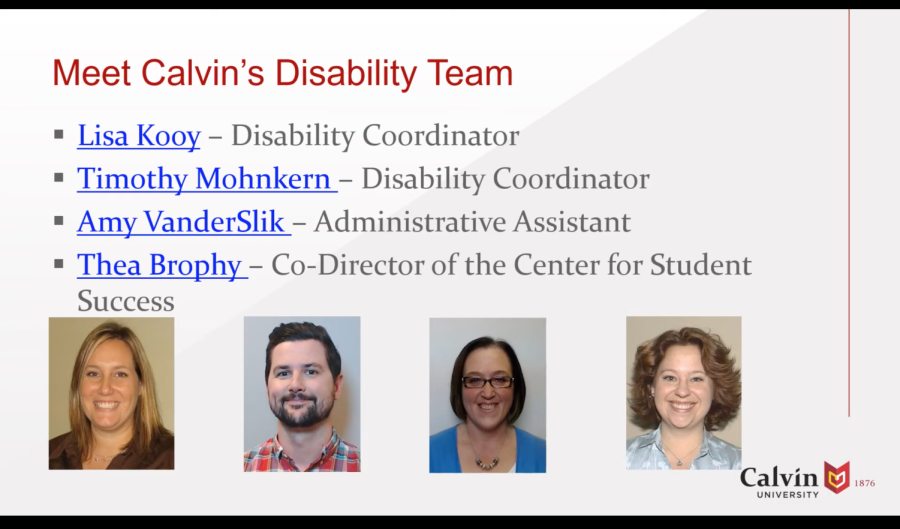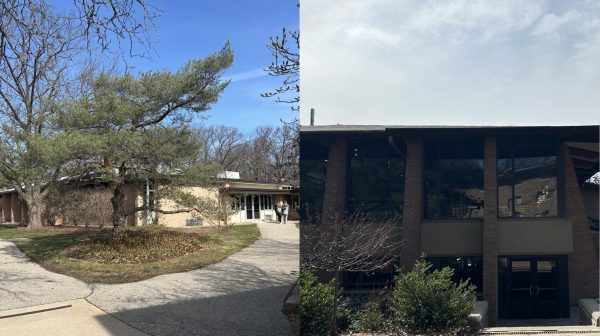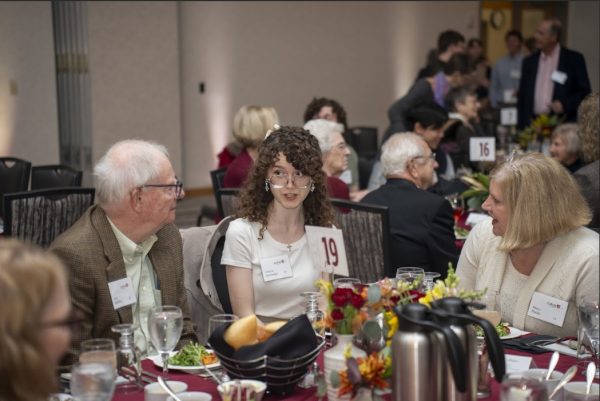The journey to accessibility: Calvin’s ongoing audit promotes accommodations
Despite not being required by the university, Calvin’s disability services department is gearing up for an audit to determine how well they are advocating for the needs of students with disabilities.
The Campus Accessibility Advisory Committee is partnering with Disability Advocates of Kent County to evaluate Calvin’s accessibility standards. Audits by the CAAC occur every few decades, adopting new practices as cultural awareness of disabilities continually develops.
The audit, originally slated for 2019, was postponed due to the pandemic. It will determine the physical accessibility of campus by reviewing buildings one at a time. So far, Hekman Library, Hiemenga Hall and at least one residence hall have been reviewed.
According to disability coordinator Tim Mohnkern, this ongoing audit is a cause for celebration: “In the entire history of higher education, individuals with disabilities have been welcome for only a small number of years. It’s exciting to, each day, be a support to students who would not have had the opportunity to earn a college education 40 or 50 years ago.” The CDC states that one in four Americans is living with some type of disability (61 million Americans). Of all people with disabilities in the US, 13.7 percent have a mobility impairment that limits walking or climbing stairs.
For students with disabilities, accommodations are currently available. Lisa Kooy, another disability coordinator, told Chimes that Calvin engages in dialogue with students to determine what best supports their needs including academic, housing and programming related accommodations. These accommodations are regularly evaluated through disability services’ partnership with professional disability advocacy organizations. This can include electronic textbooks, modifications to bathrooms, priority registration or independent studies in physical education courses.
Calvin prides itself on being a welcoming place, bridging gaps between students, faculty and community. In doing so, it strives to provide assistance to students with a variety of physical and psychological disabilities including mobility and vision impairments, chronic health conditions, learning disabilities and more. Calvin is also one of only five universities in Michigan to offer inclusive learning opportunities for students with intellectual disabilities.
Using a three-pronged approach, Calvin evaluates the extent of need that individuals with disabilities require accommodations for. Student reports, observation and external documentation are used to address the severity of the disability.
Calvin follows the Americans with Disabilities Act for guidance as awareness of disability continues to develop. The ADA is a civil rights law that protects the rights of individuals with disabilities. At Calvin, this is an ongoing process of testing and modification to determine if the campus itself is accessible to all students. According to Mohnkern, a strong policy maximizes “accessibility and equitable opportunities” for those on campus.
According to Ethan Meyers, a first-year student with cerebral palsy, Calvin is an accommodating university. He recalled a meeting prior to his move-in this August to ensure his transition to Calvin went smoothly and a grab-bar that was installed in his dorm bathroom. He lives in Kalsbeek-Huizenga-van Reken, one of the two accessible dorms on campus. When asked about experiencing ableism at Calvin, Meyers explained that most of his peers have been “kind and thoughtful, and always willing to help if [he needs] a hand.”
This trend of empathy doesn’t stop with students. It is evident in the efforts of the disability services department as well. According to Kooy, providing these accommodation services isn’t just a job — it’s a calling.
Meyers wanted Calvin to know that life with a disability is a constant: “My disability is so normal to my life that I often don’t think about it, but at the same time it is a factor in many aspects of my life. My disability interrupts my life just slightly, but constantly. For example, most mornings I leave before my roommate, and he still usually beats me to class. I need help carrying drinks or plates of food at the dining hall. Every once in a while, I catch somebody’s stare.”
If parts of campus are inaccessible or out of order, please contact the CAAC. Register for accommodations with disability services at disabilityservices@calvin.edu or call (616) 526-6155.







